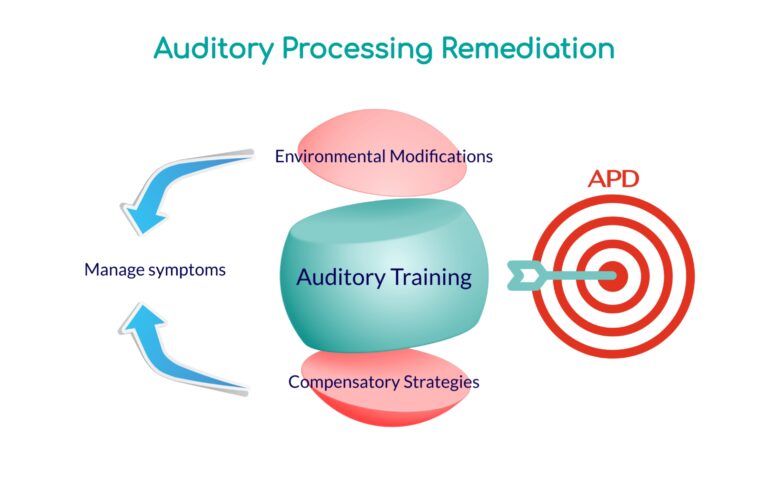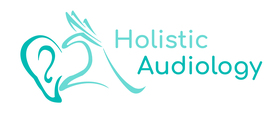for Adults and Children
Hearing sounds is an amazing feat, though to be able to converse with others, our brain needs to be able to make sense of those sounds and interpret them correctly. This skill is called Auditory Processing (AP).
The processing of auditory sounds we hear can be challenging for some of us, despite having normal hearing levels. Auditory processing disorder (APD), also known as central auditory processing disorder (CAPD) is when the sounds being detected by the hearing organ are not being correctly processed at the brain level. This deficiency makes it challenging to preserve, refine, analyse, modify, organise and interpret different sounds correctly. Depending on the area of auditory processing affected at the brain level, individuals experience a range of different listening and communication difficulties. For example, one individual incorrectly perceives and confuses similar sounding words, like ‘haze’ and ‘ways’; whereas another is unable to perceive and interpret intonation in speech, hence, misinterpreting humour as sarcasm.
The most common symptoms of APD are experiencing difficulty understanding spoken language in noisier environments and struggling to follow the speech of more rapid talkers. APD is also often accompanied with reduced auditory memory.
Listening Difficulties in Adults
APD deficiencies exist amongst young and middle-aged adults. Adults with auditory processing issues often experience difficulties in all aspects of their lives, including in the work environment. Challenges at work may include difficulties with: telephone conversations, understanding more complex spoken instructions, following more detailed and/or lengthier spoken directions, clearly distinguishing and understanding individual voices at a meeting, difficulty conversing in the noisier environments such as in the tearoom or open plan office, and others.
APD is not attributed to hearing loss, and its prevalence increases with age. According to a population study, up to 76% of Australian adults aged 55 years and over have an auditory processing disorder.
Listening difficulties and impaired auditory processing symptoms in adults can influence one’s sense of overall and mental wellbeing. It can lead to increased fatigue and episodes of ‘zoning out’. Studies have also shown that experiencing auditory processing deficiencies cause people to perceive their listening challenges as a large-scale problem that fuels their anxiety levels, which in turn increases their perceived sense of communication difficulties. These listening problems become a profound source of dissatisfaction in their lives.
Listening Difficulties in Children
APD deficiencies also exist in up to 10% of children. Auditory processing issues may co-exist with attention-deficit hyperactivity disorder (ADHD), reading and learning difficulties, and language impairment. Research has shown that nearly 67% of children diagnosed with APD also have 1-2 other disorders. Studies have also identified that auditory processing impairment adversely impacts learning and academic performance, and contributes to emotional and social problems.
Children experiencing auditory processing difficulties often report challenges with: following spoken instructions, understanding speech in noisier environments, concentrating and/or paying attention, literacy and academic development; and may also exhibit poor memory skills, language and/or speech delays.
How Does APD develop?
APD can result from a number of causes and have been linked to brain tumour, head trauma (such as, concussion), illnesses (such as, meningitis and Lyme disease), cardiovascular disorders (such as, coronary heart disease and stroke), metabolic disorders, epilepsy, prematurity, low birth weight and genetics.
Are There Assessments To Identify APD?
Listening difficulties and auditory processing deficiencies can be identified by specialised auditory processing testing. APD assessments are administered by qualified audiologists, to identify the area(s) of auditory processing deficiency.
APD testing is done following a comprehensive hearing assessment to first determine and/or rule out any contributing hearing or ear related factors.
Can I Treat and Manage APD Symptoms?
AP symptoms can be managed through modifying the listening environment and/or using communication strategies to compensate for the auditory processing deficiency. These management options may help ‘cover-up’ the difficulties; however, do not actually address the core nature of the listening challenges.
To properly address auditory processing issues, listening training for the brain is required to build the auditory and processing skills required to optimise communication abilities.

There are many auditory training programmes on the market, and one is not equal to another. The suitability and efficacy of programmes for each individual is dependent upon the area(s) of auditory processing deficiency, age, management ability and commitment level to training.
At Holistic Audiology, an APD Treatment and Management Plan is tailored for each individual, following a comprehensive auditory processing assessment by our APD-certified specialist.
APD treatment and management options
Our Readers Also Like…
Research has unveiled a compelling connection between hearing aid use and cognitive health, particularly in reducing the risk of dementia.
Optimising Ear & Hearing Health is one of our vital senses that lets us be connected and engaged with the world around us. It is often taken for granted...
Optimising Your Communication Abilities & Quality of Life ‘I hear, but don’t understand. ’‘Huh, what did you say? ’‘Can you repeat?" Hearing loss and related ear disorders can pose substantial negative impacts on...
REFERENCES:
American Speech-Language-Hearing Association. (n.d.) Central Auditory Processing Disorder. https://www.asha.org/practice-portal/clinical-topics/central-auditory-processing-disorder/
Bamiou, D. E., Musiek, F. E. & Luxon, L. M. (2001). Aetiology and clinical presentations of Auditory Processing Disorders – a review. Archives of Disease in Childhood, 85, 361-365.
Ferguson, M. A. (2014). Characteristics of auditory processing disorder in primary school-aged children. Curtin University.
Golding, M., Carter, N., Mitchell, P., Hood, L. J. (2004). Prevalence of Central Auditory Processing (CAP) Abnormality in an Older Australian Population: The Blue Mountains Hearing Study. J Am Acad Audiol, 15(9), 633-642. https://doi.org/10.3766/jaaa.15.9.4
Obuchi, C., Ogane, S., Sato, Y., & Kaga, K. (2017). Auditory symptoms and psychological characteristics in adults with auditory processing disorders. Journal of otology, 12(3), 132–137. https://doi.org/10.1016/j.joto.2017.05.001
Shaaban, T. S. K. (2021). Impact of Central Auditory Processing Disorder (CAPD) on the Academic Performance of Children of Early Childhood Stage: A Systematic Review and Meta-analysis. MRK Reading and Knowledge Journal, 21(236), 49-67. https://doi.org/10.21608/mrk.2021.175446



